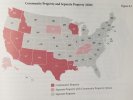Some legal food for thought from today's Wills class reading.
Separate Property: Spouses own separately all earnings and acquisitions from earnings during the marriage unless they agree to a joint form of ownership.
Community Property: Spouses retain separate ownership of property brought to the marriage, but they own all earnings and acquisitions from earnings during the marriage in equal, undivided shares. The death of one spouse dissolves the community. The deceased spouse owns and has testamentary power over his or her half of the community. The surviving spouse owns the other half.
In all but 1 (Georgia) of the separate property states, a surviving spouse is entitled to an elective or forced share, typically one-third, of the decedent spouse’s estate.
In the community property states, each spouse owns all earnings during the marriage in equal, undivided shares.
This means that poly families may have issues upon the death of the husband if one of the wives is a earthly legal marriage and the others are spiritual marriages only. In a community property state, the husband can only distribute half the property to the other wives after death. In some separate property states, the legal wife gets 1/3 of the property no matter what. Depending on the number of wives and children involved, that could be a big problem.
One solution would be to not have any legal marriages. Then all the wives are on the same footing. Unmarried men should give that serious consideration. Of course many people get married before they realize poly is an option and I don't think encouraging a husband to legally divorce his first wife while remaining spiritually married is a good idea.
When I am a practicing lawyer next year, I plan to work through a plan for poly families. For now though, this is just information to help ask the right questions when you do talk to a real lawyer about estate planning.
This map shows which states are which:

*Not legal advice. Not a lawyer.*
Separate Property: Spouses own separately all earnings and acquisitions from earnings during the marriage unless they agree to a joint form of ownership.
Community Property: Spouses retain separate ownership of property brought to the marriage, but they own all earnings and acquisitions from earnings during the marriage in equal, undivided shares. The death of one spouse dissolves the community. The deceased spouse owns and has testamentary power over his or her half of the community. The surviving spouse owns the other half.
In all but 1 (Georgia) of the separate property states, a surviving spouse is entitled to an elective or forced share, typically one-third, of the decedent spouse’s estate.
In the community property states, each spouse owns all earnings during the marriage in equal, undivided shares.
This means that poly families may have issues upon the death of the husband if one of the wives is a earthly legal marriage and the others are spiritual marriages only. In a community property state, the husband can only distribute half the property to the other wives after death. In some separate property states, the legal wife gets 1/3 of the property no matter what. Depending on the number of wives and children involved, that could be a big problem.
One solution would be to not have any legal marriages. Then all the wives are on the same footing. Unmarried men should give that serious consideration. Of course many people get married before they realize poly is an option and I don't think encouraging a husband to legally divorce his first wife while remaining spiritually married is a good idea.
When I am a practicing lawyer next year, I plan to work through a plan for poly families. For now though, this is just information to help ask the right questions when you do talk to a real lawyer about estate planning.
This map shows which states are which:

*Not legal advice. Not a lawyer.*
